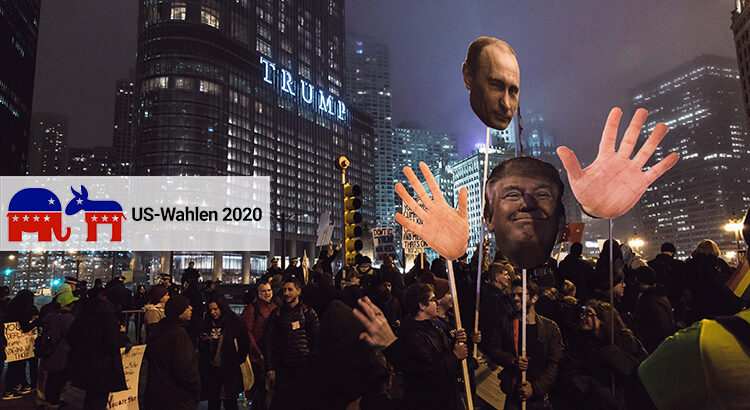“Russian interference” became a buzzword in the 2016 US presidential election and throughout the four years of Trump’s presidency. In the run up to the 2020 election, purported or real threats from Moscow have been called out again, both by serious reports and rather questionable campaigns like a (privately funded) billboard in New York that – in reference to Trump’s alleged collusion with the Kremlin – warned that “Russian lessons are expensive”. In contrast to this preoccupation with Russia, the debate or rather the absence of debate in Moscow indicates a lack of interest in the US elections and points to the fact that Russian expectations are low.
When Donald Trump won the presidential elections in 2016, Russian politicians opened bottles of champagne in the Russian parliament. However, high hopes that the post-2014 crisis in US-Russian relations could be overcome with a new leader in the White House have not materialized. Instead, multiple rounds of harsh sanctions, a new and more assertive National Security Strategy and (albeit limited) military support for Ukraine marked US policy vis a vis Russia in the past four years. “Being tough on Russia” is now considered an important qualification for the 2020 presidential candidates. Thus, Biden repeatedly accused Trump of playing “a subservient role to a Russian leader” which is “humiliating and embarrassing for the rest of the world to see”, while Trump’s Foreign Minister Pompeo stated that “we’re the toughest administration ever on Russia”.
This has led to a certain disappointment in Moscow, but also to a more realistic assessment of what is feasible. It could be argued that Trump’s policy priorities and his personal leadership style make him easier to read for the Russian political elite than his challenger Biden. The latter has been exemplified by Trump’s latest scandalous announcement to not recognize the results of the election if he loses and instead to “see what happens”. However, there is no clear preference for the incumbent.
Change for the positive is not probable with foreign policy veteran Joe Biden either. Despite having coined the term “reset” and pushed for rapprochement in US-Russian relations back in 2009 while serving as Vice President under Obama, Biden has become an outspoken and consistent critic of Putin’s Russia in the past years. A Democratic president is also likely to put policy issues like human rights, climate change or democracy promotion back on the agenda and to mend fences with partners in the EU, which could contribute to stronger attempts “to stand up to the Kremlin”.
No new “resets” expected
With these two options on the table, Russia’s overall expectations are low. As Foreign Minister Sergei Lavrov has put it with a certain bitterness, although “common sense” should tell the US leadership that cooperation with Russia is necessary, “we understand that there will be no radical changes in our relations neither with the Democrats, nor with the Republicans”. In a recent interview, Vladimir Putin himself came up with a surprisingly balanced list of pros and cons to both candidates (cf. Table 1). This also resonates with the coverage by the Russian state media, that – unlike 2016 – does not take sides and confines itself to the role of an impartial observer of whatever new scandal is going on across the Atlantic.
This, again, points to another reason why the upcoming presidential election is not a priority for Moscow. The current desolate state of domestic politics in the US – from Covid-19 mismanagement to violent social unrest and a presidential debate that has been deemed a “national disgrace” – creates a favorable situation for Russia that does not require much action. On the one hand, it makes it easy for the Russian leadership to present itself in a positive light, both domestically and internationally. Thus, former Prime Minister Dmitri Medvedev stated that Washington is “failing to see the beam in their own eye” while criticizing electoral processes in Russia. Additionally, a US that is preoccupied with domestic issues and a disunited West allows Moscow to focus on the many other pressing issues in its immediate neighborhood such as the protests in Belarus, the outbreak of war in Nagorno Karabakh or the crisis in Kyrgyzstan.
Significant other no more
Despite the fact that US and Russian authorities still frequently instrumentalize each other in internal debates and conveniently use each other as scape goats (e.g. Russia gate or Navalny as CIA agent), mutual interdependence is at its lowest since the end of the Cold War. Russia has finally given up any pretences of trying to join the bigger political West (“Russia’s epic westward quest is over”), whereas the United States has realised that appeasing or accommodating Putin’s Russia is not leading to any tangible results. Summit diplomacy between Trump and Putin did more damage than good (e.g. Summit in Helsinki in 2018) and exchange between civil societies is reduced to a minimum, as symbolized by the closure of the US Consulate General in St. Petersburg in 2018 and the Russian General Consulate in San Francisco. Economic and trade relations, already limited to start with, have become essentially insignificant.
With the death of the milestone Intermediate-Range Nuclear Forces Treaty (INF) and grim prospects for the Open Skies Treaty and New START (Strategic Arms Reduction Treaty), the US and Russia are also losing their previous prominence as guarantors of international strategic stability. With the US withdrawal from JCPOA (Joint Comprehensive Plan of Action), by which Russia alongside other Western powers and China hoped to settle the Iranian nuclear problem, the number of fora where Moscow and Washington can keep up dialogue and cooperation is reaching a dangerously low mark. To some extent, the situation is even worse than during Cold War (from the mid-1960s onward), when the parties at least had neutral and functioning platforms to fall back on, such as the Conference for Security and Co-operation in Europe (CSCE). Against this background, it is Beijing that could become the new point of reference for both Russia and the US – be it as prospective partner or “greatest threat”.
Road to 2024?
In 2024, presidential elections will take place in both Russia and the US which could bring (unforeseeable) momentum to US-Russian relations. Until then, the two are most likely to remain in crisis management mode, with the best-case scenario being an avoidance of further escalation and supporting limited cooperation in specific policy fields when possible. Recent halfhearted policy initiatives on nuclear arms control – pushed by the US – and cyber security and non-interference – suggested by Putin – are not likely to bear any fruit and can be considered merely symbolic. There are some relevant international issues where both countries’ interests are compatible (like the OSCE Minsk Group on Nagorno Karabakh or the North Korean nuclear program) but the willingness to capitalize on this relationship is largely lacking.
Perhaps, recognition of this new “mutual insignificancy” in both countries could help readjust expectations. A realistic assessment of what can be achieved together would allow Moscow and Washington to concentrate on a more narrow and pragmatic agenda of “deliverables”. According to the emerging literature on dissociation processes, this separation might eventually create certain windows of opportunities, if the process is managed correctly and if emotional tensions caused by unreasonably high expectations are settled. So far, we can observe a growing indifference vis a vis the United States in Russia. This indifference, however, is still fraught with various “escalation traps” which emerge in both conventional (military drills in dangerous proximity) and new spheres (such as cyber) of political relations.
Table 1: Vladimir Putin on US election, interview with Rossiya TV channel, 07. October 2020
| Statements on Trump | Statements on Biden |
| + | – | + | – |
| „incumbent President Trump has repeatedly expressed interest in the improvement of Russian-American relations” | „the intentions that President Trump spoke about earlier have not been fully realised“ [“largely due to a certain bipartisan consensus on the need to contain Russia, to curb our country’s development”] | „I still like many of these left-wing values. Equality and fraternity. What is bad about them? In fact, they are akin to Christian values. (…) this can be seen as an ideological basis for developing contacts with the Democratic representative.“ | „rather sharp anti-Russian rhetoric” |
| „we have achieved a lot on a bilateral basis” | „the greatest number of various kinds of restrictions and sanctions were introduced during the Trump presidency.” | „The Soviet Union also supported the African Americans’ movement for their legitimate rights. (…) So, this is something that can be seen, to a degree, as common values, if not a unifying agent for us.” [on the African American electorate of the Democratic Party] | „It is proof of the standard of the political culture – or the lack thereof.” [on Biden’s “Trump is Putin’s puppy” statement during the presidential debate] |
| „Nevertheless, again, bilateral trade has grown during the Trump presidency.” | „The incumbent’s administration withdrew from the INF treaty. (…) And I believe it is a big danger to international stability and security.” | „For example, candidate Biden has said openly that he was ready to extend the New START or to sign a new strategic offensive reductions treaty. This is a very serious element of our potential collaboration in the future.” | |
| „Our joint work to stabilise the world energy market has been unfolding quite well“ | “A number of our joint projects, modest, but viable, have not been implemented – the business council project, expert council, and so on.” |



